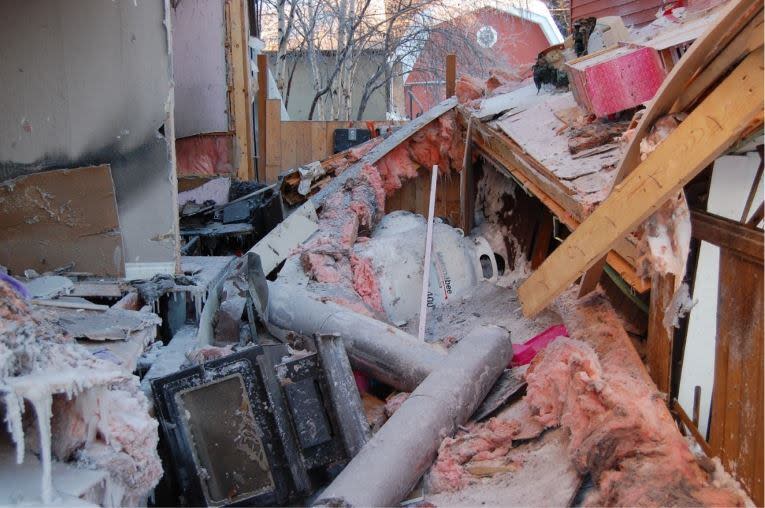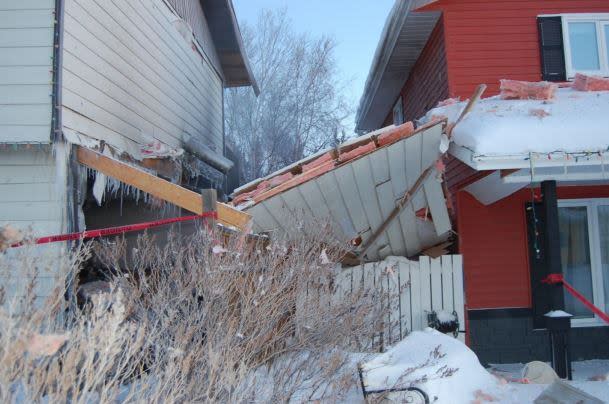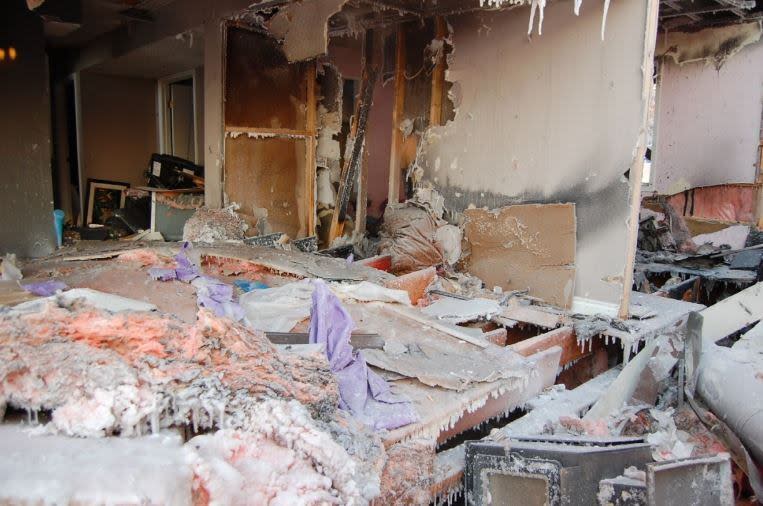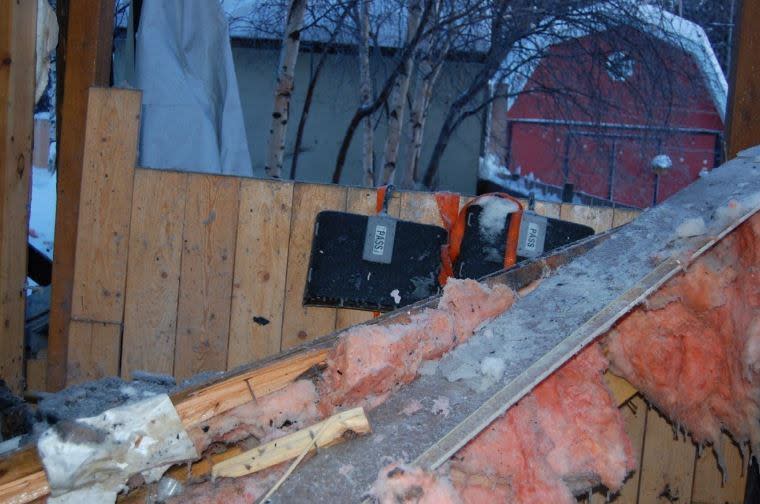N.W.T. homes damaged in 2022 explosions both had gas work done without permits

Properties in Hay River and Yellowknife damaged by explosions back in 2022 both had work to propane systems done without required permits, according to documents obtained by CBC News.
The blasts were not related, but happened within a short period of time: the first levelled a garage and damaged a home and surrounding neighbourhood in Hay River on Nov. 26, while a second caused extensive damage to a home on Dagenais Drive in Yellowknife on Dec. 6.
The N.W.T. Office of the Fire Marshal said at the time both explosions were caused by propane. They were also said not to be suspicious.
Fire investigation reports from the fire marshal's office, obtained through an access to information request, show both properties had work done to their propane systems for which the necessary permits and inspections were not carried out.
The reports don't assign blame for the explosions, and say both are considered to be "accidental."

The lower right wall of the home in Yellowknife leaning on a neighbouring home after the blast. (N.W.T. Office of the Fire Marshal)
What happened in Hay River
Through the course of his investigation into the blast in Hay River, assistant fire marshal TJ Moore found that a generator and its recently upgraded piping may have been the cause of a propane leak inside a garage on Beaver Cres.
The conclusion is "inconclusive," Moore wrote, but is based on evidence, observations and history.
Moore said a witness, whose identity was removed from the report, said a generator inside the garage had been affected by the spring flooding earlier that year. "The generator had seemed to be sputtering when the [redacted] had been testing it previously, so [redacted] wanted a larger line installed in case it was due to lack of fuel."
The report says Stittco Utilities, a company that operates the propane pipeline in Hay River, was asked to do the work. It was carried out two months before the explosion.
"The upgrades to the piping for the generator was conducted without permit or inspection as required by the GNWT Gas Protection Regulations…. The generator and its piping appears to be the only source of propane gas which could be the source of the leak, which was the material that first ignited."
CBC News approached Stittco Utilities for comment. Brian Brandsgard, who oversees Stittco's operations across Canada, said Superior Propane — Stittco's parent company — would send a statement. As of publication time, that statement had not been received.
Doug Powder, who lived in the home, confirmed to CBC News an insurance company is investigating what happened and declined to comment. He said he was also injured in the explosion, but has since recovered.
Moore found that the leak inside the 26-foot-by-26-foot garage grew undetected, and the explosion happened after a person went inside and turned on the lights and furnace while searching for a pair of gloves.
The blast levelled the wood and tin garage, burned vehicles stored inside the structure, seriously damaged the home and threw debris as far as 120 metres away, the report said. It also caused structural damage to several other homes in the area.
The day of the explosion, Hay River's deputy mayor said it had also caused two people non-critical injuries.
What happened in Yellowknife
John Ritchie, an assistant fire marshal in the North Slave Region, found propane-related work had been carried out at the home on Dagenais Drive in Yellowknife without the required permit as well.
Ritchie said three 500-litre propane tanks and the corresponding lines and regulators had been installed by Matonabee Petroleum in Yellowknife earlier that year, in June.

The first floor living room in the front right corner of the home on Dagenais Drive, where the wood stove was located. (N.W.T. Office of the Fire Marshal)
"It was confirmed by Mr. Kevin Dunbar, manager of compliance and licensing, that no permit had been granted for the installation of the new propane tank and lines," the report said. "It must be noted that no direct connection is stated or implied between the failure to secure a permit for the propane installation and the subsequent explosion."
Ritchie found one of the regulators failed in the extreme cold, and leaking propane gas — because it's heavier than air — pooled in a crawl space under the home. A wood stove burning into the night is the "likely" source of ignition, the report said, but it's unclear how the two things interacted.
"There are other plausible ignition sources, such as an errant spark from a wood stove chimney or perhaps some wiring," he wrote.
Vandy Lipinski, an owner of Matonabee Petroleum, declined to comment on the work carried out without a permit, saying the company has "worked through the process" with its insurance company.
Scott Dyke, who lived in the home on Dagenais Drive with his family, also declined to comment to CBC News.
Without a permit, things can get 'ugly'
Dunbar, the manager and chief electrical inspector within the territory's compliance and licensing unit who was cited in one of the reports, wouldn't talk to CBC News about the incidents, citing ongoing investigations.
He did, however, urge homeowners and companies to get permits and explain when they're required.
"Sometimes people don't want to get permits or contractors, whatever the case is. And if something does go wrong, yeah, it can be pretty ugly," he said.

A pair of propane heaters at Dagenais Drive, which the fire investigation report notes were not installed. (N.W.T. Office of the Fire Marshal)
Dunbar said any type of propane installation requires a permit before work is started. That includes installing tanks themselves, gas lines or something that is being hooked up to the tank, like a furnace or a gas-fired stove.
They range in cost, from $200 for a residential installation up to nearly $600 for an installation at a temporary work camp.
The territory's compliance and licensing unit handles permits for this kind of work throughout the N.W.T., said Dunbar. Sometimes, he said, they'll grant a homeowner a permit. But 95 per cent of the time, it goes to a gas fitter who has to be registered with the government and qualified to do the work.
Once the work is done, Dunbar said it's up to the gas fitter or homeowner to call the territory for an inspection.
If a homeowner is uncertain whether the proper steps have been carried out, Dunbar said they should ask the contractor they worked with for inspection reports, which will show whether or not the work is code compliant.
"If they can't produce it, they haven't pulled permits," he said.
Dunbar said the compliance and licensing unit does inspections for all of the gas companies in Yellowknife on an almost daily basis. "They know the act and regulations just as well as we do, and they know the implications if they get caught without it or if something happens with it."
Dunbar said "not that many" people are caught doing gas work without a permit, but there may be non-permitted installations in the N.W.T. that the territory isn't aware of.
A company that breaks the rules can be fined up to $500 for every day that the offence continues, according to the territory's Gas Protection Act. An individual can be fined up to $200 per day.

